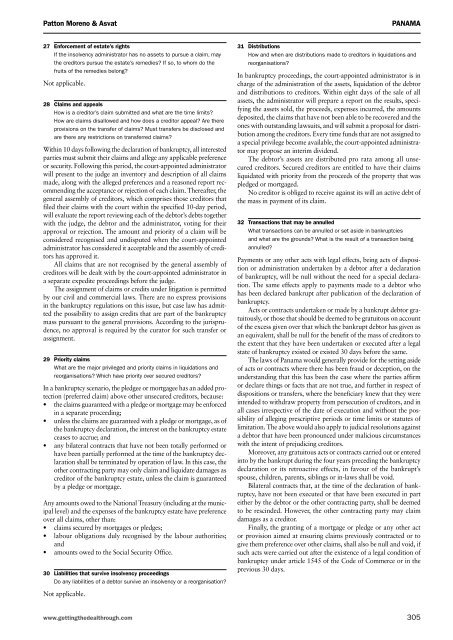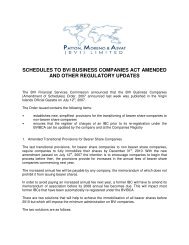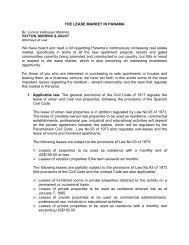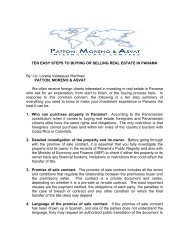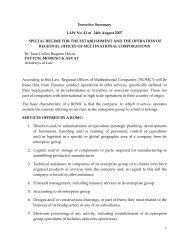Restructuring & Insolvency - patton moreno & asvat
Restructuring & Insolvency - patton moreno & asvat
Restructuring & Insolvency - patton moreno & asvat
You also want an ePaper? Increase the reach of your titles
YUMPU automatically turns print PDFs into web optimized ePapers that Google loves.
Patton <strong>moreno</strong> & <strong>asvat</strong> Panama<br />
27 Enforcement of estate’s rights<br />
If the insolvency administrator has no assets to pursue a claim, may<br />
the creditors pursue the estate’s remedies? If so, to whom do the<br />
fruits of the remedies belong?<br />
Not applicable.<br />
28 Claims and appeals<br />
How is a creditor’s claim submitted and what are the time limits?<br />
How are claims disallowed and how does a creditor appeal? Are there<br />
provisions on the transfer of claims? Must transfers be disclosed and<br />
are there any restrictions on transferred claims?<br />
Within 10 days following the declaration of bankruptcy, all interested<br />
parties must submit their claims and allege any applicable preference<br />
or security. Following this period, the court-appointed administrator<br />
will present to the judge an inventory and description of all claims<br />
made, along with the alleged preferences and a reasoned report recommending<br />
the acceptance or rejection of each claim. Thereafter, the<br />
general assembly of creditors, which comprises those creditors that<br />
filed their claims with the court within the specified 10-day period,<br />
will evaluate the report reviewing each of the debtor’s debts together<br />
with the judge, the debtor and the administrator, voting for their<br />
approval or rejection. The amount and priority of a claim will be<br />
considered recognised and undisputed when the court-appointed<br />
administrator has considered it acceptable and the assembly of creditors<br />
has approved it.<br />
All claims that are not recognised by the general assembly of<br />
creditors will be dealt with by the court-appointed administrator in<br />
a separate expedite proceedings before the judge.<br />
The assignment of claims or credits under litigation is permitted<br />
by our civil and commercial laws. There are no express provisions<br />
in the bankruptcy regulations on this issue, but case law has admitted<br />
the possibility to assign credits that are part of the bankruptcy<br />
mass pursuant to the general provisions. According to the jurisprudence,<br />
no approval is required by the curator for such transfer or<br />
assignment.<br />
29 Priority claims<br />
What are the major privileged and priority claims in liquidations and<br />
reorganisations? Which have priority over secured creditors?<br />
In a bankruptcy scenario, the pledgee or mortgagee has an added protection<br />
(preferred claim) above other unsecured creditors, because:<br />
• the claims guaranteed with a pledge or mortgage may be enforced<br />
in a separate proceeding;<br />
• unless the claims are guaranteed with a pledge or mortgage, as of<br />
the bankruptcy declaration, the interest on the bankruptcy estate<br />
ceases to accrue; and<br />
• any bilateral contracts that have not been totally performed or<br />
have been partially performed at the time of the bankruptcy declaration<br />
shall be terminated by operation of law. In this case, the<br />
other contracting party may only claim and liquidate damages as<br />
creditor of the bankruptcy estate, unless the claim is guaranteed<br />
by a pledge or mortgage.<br />
Any amounts owed to the National Treasury (including at the municipal<br />
level) and the expenses of the bankruptcy estate have preference<br />
over all claims, other than:<br />
• claims secured by mortgages or pledges;<br />
• labour obligations duly recognised by the labour authorities;<br />
and<br />
• amounts owed to the Social Security Office.<br />
30 Liabilities that survive insolvency proceedings<br />
Do any liabilities of a debtor survive an insolvency or a reorganisation?<br />
Not applicable.<br />
31 Distributions<br />
How and when are distributions made to creditors in liquidations and<br />
reorganisations?<br />
In bankruptcy proceedings, the court-appointed administrator is in<br />
charge of the administration of the assets, liquidation of the debtor<br />
and distributions to creditors. Within eight days of the sale of all<br />
assets, the administrator will prepare a report on the results, specifying<br />
the assets sold, the proceeds, expenses incurred, the amounts<br />
deposited, the claims that have not been able to be recovered and the<br />
ones with outstanding lawsuits, and will submit a proposal for distribution<br />
among the creditors. Every time funds that are not assigned to<br />
a special privilege become available, the court-appointed administrator<br />
may propose an interim dividend.<br />
The debtor’s assets are distributed pro rata among all unsecured<br />
creditors. Secured creditors are entitled to have their claims<br />
liquidated with priority from the proceeds of the property that was<br />
pledged or mortgaged.<br />
No creditor is obliged to receive against its will an active debt of<br />
the mass in payment of its claim.<br />
32 Transactions that may be annulled<br />
What transactions can be annulled or set aside in bankruptcies<br />
and what are the grounds? What is the result of a transaction being<br />
annulled?<br />
Payments or any other acts with legal effects, being acts of disposition<br />
or administration undertaken by a debtor after a declaration<br />
of bankruptcy, will be null without the need for a special declaration.<br />
The same effects apply to payments made to a debtor who<br />
has been declared bankrupt after publication of the declaration of<br />
bankruptcy.<br />
Acts or contracts undertaken or made by a bankrupt debtor gratuitously,<br />
or those that should be deemed to be gratuitous on account<br />
of the excess given over that which the bankrupt debtor has given as<br />
an equivalent, shall be null for the benefit of the mass of creditors to<br />
the extent that they have been undertaken or executed after a legal<br />
state of bankruptcy existed or existed 30 days before the same.<br />
The laws of Panama would generally provide for the setting aside<br />
of acts or contracts where there has been fraud or deception, on the<br />
understanding that this has been the case where the parties affirm<br />
or declare things or facts that are not true, and further in respect of<br />
dispositions or transfers, where the beneficiary knew that they were<br />
intended to withdraw property from persecution of creditors, and in<br />
all cases irrespective of the date of execution and without the possibility<br />
of alleging prescriptive periods or time limits or statutes of<br />
limitation. The above would also apply to judicial resolutions against<br />
a debtor that have been pronounced under malicious circumstances<br />
with the intent of prejudicing creditors.<br />
Moreover, any gratuitous acts or contracts carried out or entered<br />
into by the bankrupt during the four years preceding the bankruptcy<br />
declaration or its retroactive effects, in favour of the bankrupt’s<br />
spouse, children, parents, siblings or in-laws shall be void.<br />
Bilateral contracts that, at the time of the declaration of bankruptcy,<br />
have not been executed or that have been executed in part<br />
either by the debtor or the other contracting party, shall be deemed<br />
to be rescinded. However, the other contracting party may claim<br />
damages as a creditor.<br />
Finally, the granting of a mortgage or pledge or any other act<br />
or provision aimed at ensuring claims previously contracted or to<br />
give them preference over other claims, shall also be null and void, if<br />
such acts were carried out after the existence of a legal condition of<br />
bankruptcy under article 1545 of the Code of Commerce or in the<br />
previous 30 days.<br />
www.gettingthedealthrough.com 305


